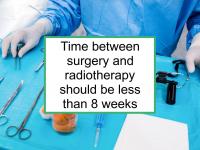A new study designed to investigate the survival impact of delays in beginning radiation treatment after neoadjuvant chemotherapy (chemotherapy designed to shrink a breast tumor before surgery) and surgery has reported that for those undergoing neoadjuvant chemotherapy, eight weeks (56 days) or less appears preferable to longer time periods.
Why long wait before starting radiation matters
Tumors of newly diagnosed women often have been growing for years before being detected. In cases of very indolent disease, some very small tumors could potentially remain untreated for extended periods of time without materially affecting prognosis. However, treatment appears to "wake up" breast cancer. Any cancer cells that escape the toxic effects of neoadjuvant chemotherapy are more likely to have developed stem cell-like properties, including the ability to divide indefinitely.
Latest research finds shorter time to radiotherapy improves survival
Radiotherapy is normally recommended for breast cancer patients after such chemotherapy and surgery but the optimal time to initiation has not been established. To conduct the study, the authors analyzed data concerning 581 patients who underwent radiotherapy after neoadjuvant chemotherapy and surgery at their institution (Instituto do Cancer do Estado de São Paulo) between 2008 and 2014. A total of 430 (74%) of the women had stage III breast cancer. The women were followed for a median of 32 months.
Study participants were placed into three groups depending on the length of time between surgery and first radiation treatment: < 8 weeks (43 patients), 8-16 weeks (354), or > 16 weeks (184). Women who started radiotherapy within eight weeks of surgery were found to have far superior breast cancer-free survival than women with longer times to radiation treatment. Women in the < 8 week group also experienced markedly superior overall survival. The authors conclude that early initiation of post-operative radiotherapy may be critically important for patients after neoadjuvant chemotherapy and surgery. However, a low numbers of patients and breast cancer events in the study prevent the authors from drawing firm conclusions.
